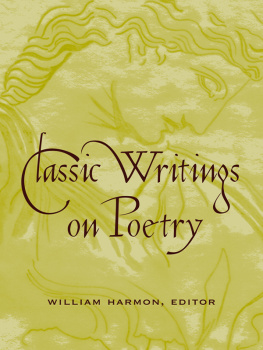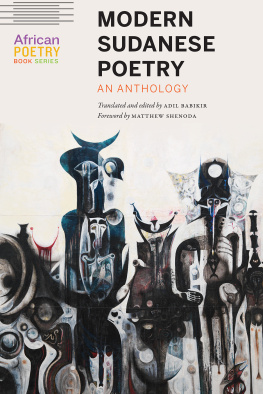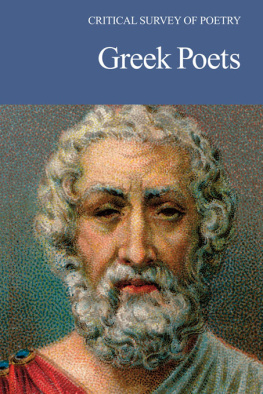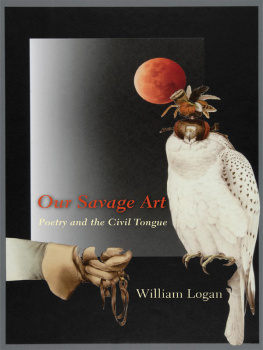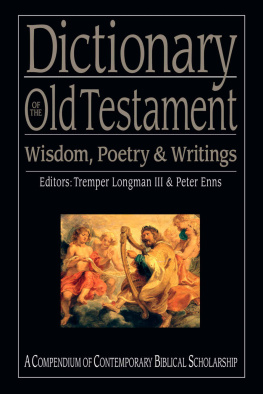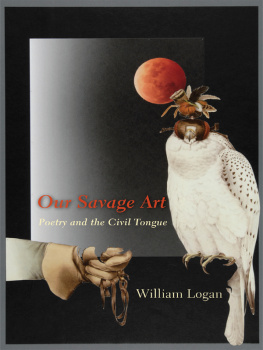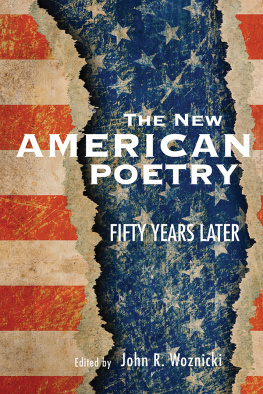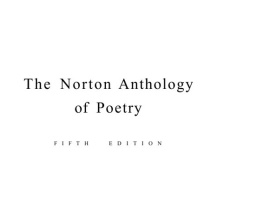Harmon - Classic Writings on Poetry
Here you can read online Harmon - Classic Writings on Poetry full text of the book (entire story) in english for free. Download pdf and epub, get meaning, cover and reviews about this ebook. City: New York;NY, year: 2005;2003, publisher: Columbia University Press, genre: Science. Description of the work, (preface) as well as reviews are available. Best literature library LitArk.com created for fans of good reading and offers a wide selection of genres:
Romance novel
Science fiction
Adventure
Detective
Science
History
Home and family
Prose
Art
Politics
Computer
Non-fiction
Religion
Business
Children
Humor
Choose a favorite category and find really read worthwhile books. Enjoy immersion in the world of imagination, feel the emotions of the characters or learn something new for yourself, make an fascinating discovery.
Classic Writings on Poetry: summary, description and annotation
We offer to read an annotation, description, summary or preface (depends on what the author of the book "Classic Writings on Poetry" wrote himself). If you haven't found the necessary information about the book — write in the comments, we will try to find it.
Classic Writings on Poetry — read online for free the complete book (whole text) full work
Below is the text of the book, divided by pages. System saving the place of the last page read, allows you to conveniently read the book "Classic Writings on Poetry" online for free, without having to search again every time where you left off. Put a bookmark, and you can go to the page where you finished reading at any time.
Font size:
Interval:
Bookmark:
Classic Writings on Poetry
Classic Writings on Poetry
Edited by William Harmon

COLUMBIA UNIVERSITY PRESS
NEW YORK
Columbia University Press
Publishers Since 1893
New York Chichester, West Sussex
cup.columbia.edu
Copyright 2003 Columbia University Press
All rights reserved
E-ISBN 978-0-231-50322-8
Library of Congress Cataloging-in-Publication Data
Classic writings on poetry / edited by William Harmon.
p. cm.
ISBN 0231123701 (cloth : alk. paper)
1. PoetryHistory and criticism. 2. Poetics. I. Harmon, William, 1938
PN1016.C53 2003
809.1dc21
2003040917
A Columbia University Press E-book.
CUP would be pleased to hear about your reading experience with this e-book at .
In the beginning, let us say, people used language for practical purposes exclusively. Then these literal ancestors of ours discovered that they could augment the practical with the aesthetic, and poetry was bornpoetry defined loosely as language used in a special way and for a special purpose beyond immediate practicalities. It remains possible, however, that the order of evolution was reversed, and that poetry came first and practicality second; some speculate that even pottery was first ornamental or ritual in purpose and only later found to be useful for cooking and storage.
Whatever the order of the first two stagescommunication then poetry, poetry then communicationit is likely that the third stage involved reflection on poetry, which we usually call criticism. Early in these early days, a poet wrote something like
Perhaps in this neglected spot is laid
Some heart once pregnant with celestial fire...,
at which any normal, intelligent reader might bridle. One would have to note, first, that it is not ones heart that becomes pregnant; second, that what something gets pregnant with is not fire; third, that fire is not normally described as celestialquite the contrary, fire is often considered infernal. One might demand, Is this surrealist? Or just nonsensical? A scholar would have to answer, No, its just conventional mid-eighteenth-century poesy. In fact, it is Thomas Grays Elegy Written in a Country Churchyard, a mine of clichs for almost three centuries: short and simple annals of the poor, paths of glory, far from the madding crowd, purest ray serene. These questions and objections mark the point where the immediate, practical use of language gives way to some use beyond the immediate or the practicalsuch as educationand seems to exist at least in part for itself. And it is here that criticism becomes interesting and valuable and vexed.
Poetry resists absolute definitions. Something that seems inseparable from and vital to poetry in one culture will be unintelligible or ridiculous in another. Rhyme, for example, has been an incidental blemish of prose in many literatures, especially those of classical antiquity (Sanskrit, Greek, Latin); in time, however, in the poetry of Europe, rhyme turned into an ornament so important that rhyme itself virtually came to mean poem, as in Coleridges The Rime of the Ancient Mariner. During the Middle Ages, when unrhymed quantitative verse still persisted from antiquity, particularly in the language of the Christian church, which was dedicated to the preservation of Latin, rhymed accentual verse was introduced for certain religious texts set to music, but rhyme was so alien to true poetry, according to many conservatives, that such texts were called proses. The honorific term verse was kept for old-fashioned poems (for example, Adeste Fideles, still sung today, does not rhyme in Latin or English). Accordingly, in the early fifteenth century, in prose could mean in rhyme. (To insult a kind of verse by calling it prose persisted for centuries, as when in 1880 Matthew Arnold delivered a famous verdict, Dryden and Pope are not classics of our poetry, they are classics of our prose.)
Sound effects do not constitute the only slippery characteristic of poetry. Rhetorical devices, so crucial to much Western poetry, also contribute to incomprehension. The English poet George Barker taught in Japan just before World War II. As Barkers fellow poet John Heath-Stubbs tells it:
George had some difficulty in getting the Japanese students adequately to understand English poetry. He set them for comment a poem of A. E. Housman... beginning The chestnut casts its flambeaux. The students came to him in a body and said: We find this poem extremely obscure. We have looked up the words in the dictionary, and it appears to say that the chestnut tree is throwing away torches. We cannot comprehend how a chestnut tree can have torches to throw away. The reason for this misunderstanding was that classical Japanese poetry makes no use whatsoever of metaphor or simile.
John Heath-Stubbs, Hindsights: An Autobiography (London: Hodder and Stoughton, 1993), 147; also recounted in Robert Fraser, The Chameleon Poet:
A Life of George Barker (London: Jonathan Cape, 2001).
That account may not accurately register the entire truth about Japanese language and literature, but the general experience will be familiar.
Beyond the levels of sound and rhetoric, between different poetics there may also be incomprehension or miscomprehension of language and concept. Ancient Hebrew poetry seems to have relied more on grammatical patterns than on any conceptual or acoustic patterns that would be familiar to speakers of an Indo-European language. Translators of the Bible have recognized that parts of it are poetry, but it is usually printed as prose. Even so, the standard subdivisions, which have been used for almost five hundred years, suggest prose and poetry together: chapters as in prose, verses as in poetry, even though the verses are printed as prose.
Since the criticism of literature is itself a species of literature, complications become exponential and controversy begins almost immediately. Among many other causes of conflict, poets and the critics of poetry disagree about diction and rhetoric. Seldom has a poem sounded remotely like real speech, but seldom has a poet failed to claim that he or she writes the way normal people talk. Everybody professes an earnest preference for the simple and direct, but any writer coming even close to simple and direct is quickly forgotten, while those who are most complex and indirectShakespeare, Milton, Wordsworth, Whitman, Dickinson, Eliotcommand respect. Even the celebrated minimalist Thoreau had to say, Simplicity, simplicity, simplicity! and Simplify, simplify, which are practically contradictions in termslikewise, Blakes To generalize is to be an idiot.
But the definitions of both generalization and idiocy change with time; the hits of one age become the laughingstock of the next. Samuel Johnson tears Miltons Lycidas to pieces for its inconsistency and presumed insincerity. William Wordsworth likewise flays Johnsons The Vanity of Human Wishes for its pompous redundancy. According to William Hazlitts description of Wordsworth:
Nothing... can be fairer, or more amusing than the way in which he sometimes exposes the unmeaning verbiage of modern poetry. Thus, in the beginning of Dr. Johnsons Vanity of Human Wishes
Let observation with extensive view
Survey mankind from China to Peru
he says there is a total want of imagination accompanying the words; the same idea is repeated three times under the disguise of a different phraseology. It comes to this: let observation with extensive observation observe mankind; or take away the first line, and the second, Survey mankind from China to Peru, literally conveys the whole.
It does not matter much that Johnsons satirical poem imitates a precursor by Juvenal that mocks pompous diction. Eighteenth-century satirists seem to have experimented with maximal redundancy, the prize going to one of Popes couplets: Or alom-stypticks with contracting powr / Shrink his thin essence like a rivelled flowr, which says the same thing at least five times over.
Next pageFont size:
Interval:
Bookmark:
Similar books «Classic Writings on Poetry»
Look at similar books to Classic Writings on Poetry. We have selected literature similar in name and meaning in the hope of providing readers with more options to find new, interesting, not yet read works.
Discussion, reviews of the book Classic Writings on Poetry and just readers' own opinions. Leave your comments, write what you think about the work, its meaning or the main characters. Specify what exactly you liked and what you didn't like, and why you think so.

